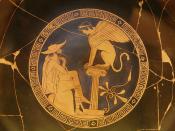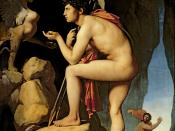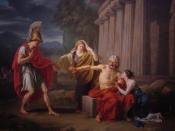According to Socrates virtue cannot be taught. It is argued that if it can be taught there must be teachers. It is agreed that the greatest of the men who possessed virtue would be the best teachers. The next argument is that if these men were going to teach it to anyone they would pass it on to their sons. One example is made of Themistocles. They conclude that his son, Cleophantus "certainly not"(Anytus 93 E) to be "a good and wise man in the way that his father was"(Socrates 93 E). Socrates asks "Do you suppose he grudged him this and purposely didn't pass on his own virtue to him?"(Socrates 93 D) The other suggestion is that the Sophists are teachers of virtue because they are "the only people who profess to teach it."(Socrates 95 C) this argument is shot down also as Socrates agrees with Meno that they also are not teachers of virtue.
Since the only two examples of teachers of virtue are disproven, Socrates then goes on to deduce that "if there are no teachers, there can be no students either."(Socrates 96 B) and also that "a subject of which there were no teachers nor students was not one which could be taught."(Socrates 96 C). In the end it is concluded "whoever has virtue gets it by divine dispensation"(100 B).
Oedipus tragic major tragic flaw is his pride and will to pursue the truth. He solves the riddle of the Sphinx to bring him the kingdom and he pursues the truth in himself. It is this truth about himself that ruins him. In the beginning of the play he summons a curse on the murderer to "drag out an evil death-in-life misery."(Oedipus 15). He is so sure that he is not the murderer he summons...


